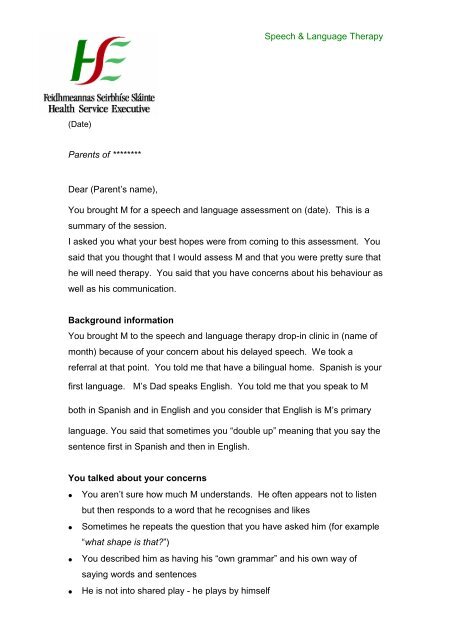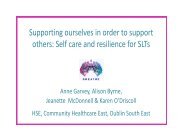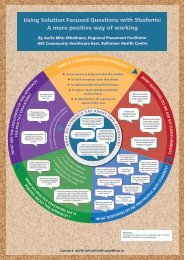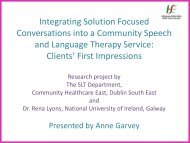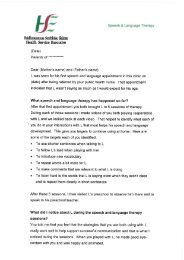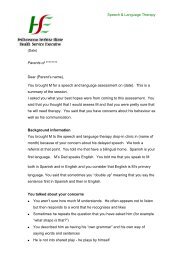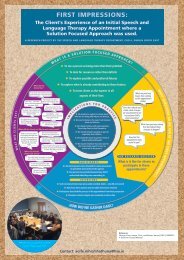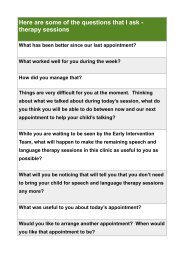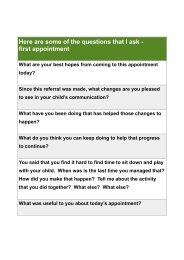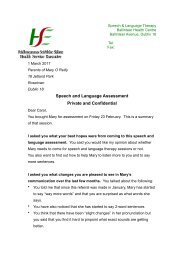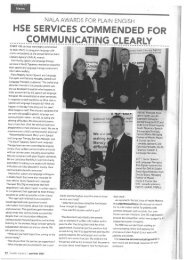Example of letter written after first appointment
You also want an ePaper? Increase the reach of your titles
YUMPU automatically turns print PDFs into web optimized ePapers that Google loves.
Speech & Language Therapy<br />
(Date)<br />
Parents <strong>of</strong> ********<br />
Dear (Parent’s name),<br />
You brought M for a speech and language assessment on (date). This is a<br />
summary <strong>of</strong> the session.<br />
I asked you what your best hopes were from coming to this assessment. You<br />
said that you thought that I would assess M and that you were pretty sure that<br />
he will need therapy. You said that you have concerns about his behaviour as<br />
well as his communication.<br />
Background information<br />
You brought M to the speech and language therapy drop-in clinic in (name <strong>of</strong><br />
month) because <strong>of</strong> your concern about his delayed speech. We took a<br />
referral at that point. You told me that have a bilingual home. Spanish is your<br />
<strong>first</strong> language. M’s Dad speaks English. You told me that you speak to M<br />
both in Spanish and in English and you consider that English is M’s primary<br />
language. You said that sometimes you “double up” meaning that you say the<br />
sentence <strong>first</strong> in Spanish and then in English.<br />
You talked about your concerns<br />
You aren’t sure how much M understands. He <strong>of</strong>ten appears not to listen<br />
but then responds to a word that he recognises and likes<br />
Sometimes he repeats the question that you have asked him (for example<br />
“what shape is that?”)<br />
You described him as having his “own grammar” and his own way <strong>of</strong><br />
saying words and sentences<br />
He is not into shared play - he plays by himself
I asked you what changes you have been pleased to see in recent<br />
months. You have noticed the following:<br />
• M recently starting using phrases and short sentences (for example “don’t<br />
eat it”). He says these in the correct contexts<br />
• He recognises numbers and can count long sequences<br />
I wondered what you have noticed gets M’s attention and what seems to<br />
help his communication. You talked about the following:<br />
• M likes physical play (for example being chased)<br />
• He likes music (for example listening to classical music, playing with his<br />
ukulele and singing)<br />
• He asks you to “draw a train” which you do. You also draw different things<br />
and encourage him to name what you draw<br />
• You realise that he doesn’t always turn to his name but that he is more likely<br />
to respond if you name an item he is interested in as well as calling his<br />
name (for example “M! Look at the train!”)<br />
• He likes playing with trains and magnets with his dad<br />
• You recognise that sometimes he needs direct motivation to do something.<br />
For example you give him a sweet when he gets out <strong>of</strong> his chair<br />
• You have noticed that he is more likely to repeat words/phrases when he<br />
plays with his dad<br />
During the assessment session you gave me a lot <strong>of</strong> useful information about<br />
M. Although you thought I would assess him, I felt that for this <strong>first</strong><br />
<strong>appointment</strong> it was more useful for me to observe him while he played by<br />
himself and with you. This gives more information about his understanding<br />
and talking in real-life. More formal assessments might be helpful at a later<br />
point. Here is what I noticed:<br />
Receptive Language: This means a child’s ability to understand what other<br />
people are saying. This includes the understanding <strong>of</strong> words, concepts and<br />
grammar. M’s receptive language:<br />
<br />
appropriate for age<br />
delayed for age<br />
needs further assessment
M doesn’t always respond to what you say to him. As you had told me, it is<br />
hard to know how if this is because he doesn’t understand or because he just<br />
isn’t interested. You said that M sometimes repeats a question that you have<br />
asked. This can indicate that he doesn’t understand what you are saying.<br />
However, it is likely that he understands more that is immediately apparent<br />
but that he needs to be very interested before he responds.<br />
Expressive Language: This means a child’s ability to use words<br />
meaningfully and to join words to form sentences, tell stories and to express<br />
his/her needs to others. M’s expressive language is:<br />
<br />
appropriate for age<br />
delayed for age<br />
needs further assessment<br />
M is 3 years old. At his age you would expect him to use lots <strong>of</strong> words and<br />
sentences. M does use words and phrases but far fewer than I would expect<br />
for his age.<br />
Speech (pronunciation): this means a child’s ability to say speech- sounds<br />
and to use these speech-sounds clearly in words and sentences. M’s speech<br />
was:<br />
<br />
appropriate for age<br />
delayed for age<br />
not assessed<br />
It was hard to understand what M was saying at times. However, this seems<br />
to be more because <strong>of</strong> his expressive language difficulties rather than<br />
difficulties saying specific speech-sounds.<br />
Social Communication: This means a child’s overall ability to use both<br />
words and non-verbal skills to communicate. It includes being interested in<br />
interacting with another person and using words or non-verbal communication<br />
(for example gestures, facial expression) to connect with people. M’s social<br />
communication skills:
appropriate for age<br />
delayed for age<br />
need further assessment<br />
This is the area that I am most concerned about. It is hard to get M’s attention<br />
and he was happy to play by himself for a lot <strong>of</strong> the session. His eye-contact<br />
with me was best when he liked an activity (for example bubbles). There<br />
were times that he engaged well with me for a few seconds at a time. For<br />
example, when I was talking to you, he opened up the lego-door and peeped<br />
through to get a response from me. When he liked that response, he tried it<br />
again a few times. He said “nose” and pointed to the tissues to let you know<br />
that he wanted to wipe his nose. When I was blowing bubbles and I waited,<br />
he said “more bubbles”. Therefore there are times when he uses<br />
words/phrases communicatively. However, overall, from what I observed and<br />
what you told me, he doesn’t use words and phrases to communicate socially<br />
as much as I would expect.<br />
What else?<br />
During the session M’s behaviour wasn’t challenging or disruptive. However,<br />
you said that it is very hard to get his cooperation a lot <strong>of</strong> the time. You said<br />
that it is like there is a “barrier inside him” and that he won’t compromise if he<br />
decides he doesn’t want to do something. You said that he is “resistant to<br />
being taught” and learns best from a screen (for example nursery rhymes,<br />
colours) rather than a person.<br />
You also talked about M’s dislike <strong>of</strong> some food-textures and that it is difficult<br />
for you to predict what he will and will not eat. Sometimes he rejects a food<br />
that he happily ate before. Before he eats any food, he presses it against his<br />
lips or nose <strong>first</strong>. I noticed him do this with biscuits you gave him during the<br />
session.<br />
In summary:<br />
M is 3 years old. His receptive and expressive language are delayed. This<br />
means that he isn’t understanding or saying as much as I would expect for his<br />
age. I am more concerned with his social communication in that it is hard to<br />
get his attention and he doesn’t use his words and phrases as<br />
communicatively as I would expect.
You also expressed some concerns about his behaviour and some sensory<br />
issues (food-textures).<br />
You asked if M might have autism spectrum disorder (ASD). I have noticed<br />
that he seems to have social communication difficulties but I can’t say if that is<br />
because he has ASD or not. However, I do think that it will be useful to make<br />
a referral to the Early Intervention Team for further assessment. I will discuss<br />
that with you at our next <strong>appointment</strong>.<br />
What happens next?<br />
1. I talked to you about a group that we run for parents <strong>of</strong> children who have<br />
difficulties with social communication. This group is made up <strong>of</strong> 5<br />
sessions in total. There will be 3 sessions for parents only and 2 sessions<br />
for just you and M.<br />
The parent sessions will be held on the following dates:<br />
*************************************************************<br />
The other 2 sessions for videoing will be arranged separately with you.<br />
You will get a <strong>letter</strong> about this group in the next few weeks so you can<br />
respond to that <strong>letter</strong> when you get it.<br />
I hope that I have correctly <strong>written</strong> everything that you told me.<br />
If you have any questions feel free to contact me.<br />
Yours sincerely,<br />
Senior Speech and Language Therapist<br />
************ *************


